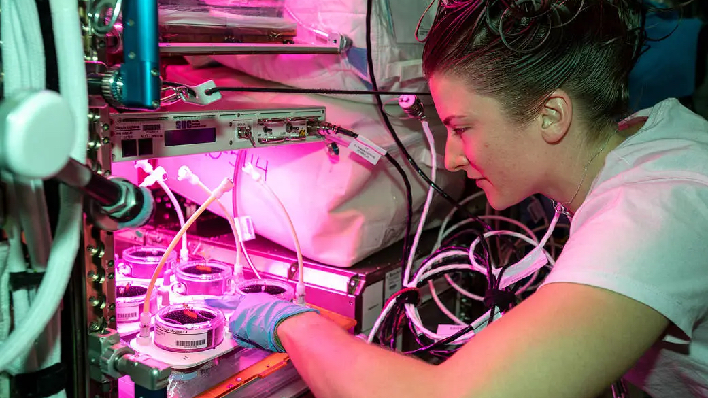Lettuce Discuss Why NASA Is Concerned About Astronauts Eating Space Salad
NASA and other space agencies have been attempting to grow different types of food on the International Space Station (ISS) over the last several years. The hope is that astronauts will be able to one day sustain a healthy diet on long stays in space, such as a trip to Mars. However, it seems that even when things like lettuce are grown in controlled environments with ideal temperature, light, and water, these leafy green vegetables are still subject to a lot of of pathogenic bacteria and fungi found on ISS.
This has raised a high level of concern for long-term missions, which could be “derailed” if a foodborne illness outbreak occurrs. Researchers say that a lot of these disease-causing microbes onboard ISS are “very aggressive” and can “easily colonize the tissue of lettuce and other plants.” This ultimately means that if a person eats lettuce that has been contaminated with E. coli or Salmonella, they can get very ill, along with others onboard.

The US Department of Health and Human Services describes Salmonella as the most common cause of foodborne illness. It often occurs in raw poultry, eggs, beef, and sometimes on unwashed fruit and vegetables. Symptoms include fever, diarrhea, abdominal cramps, and a headache, and typically lasts 4-7 days. The agency adds that if Salmonella gets into the bloodstream, it can be extremely serious, and even life-threatening.
The new research, published in Scientific Reports and in npi Microgravity, researchers grew lettuce under conditions that mimicked the weightlessness environment aboard ISS. The plants, which were subjected to simulated microgravity by rotation, were found to be more prone to infections from a human pathogen, such as Salmonella.
Normally when a plant is subjected to a stressor, the tiny pores in its leaves and stems that are used to breathe, known as the Stomata, close to defend it. The issue found by researchers is that when they added bacteria to lettuce under microgravity simulation, the leafy greens opened their stomata wide instead of closing them.
“The fact that they were remaining open when we were presenting them with what would appear to be a stress was really unexpected,” explained Noah Totsline, lead author of the recently published papers.
With the United Nations estimating that Earth will be home to 9.7 billion people in 2050, and 10.4 billion by 2100, the thought of alternate habitats beyond Earth are becoming more of a reality. So, as plant biology professor Harsh Bais points out, “You don’t want the whole mission to fail just because of a food safety outbreak.”


